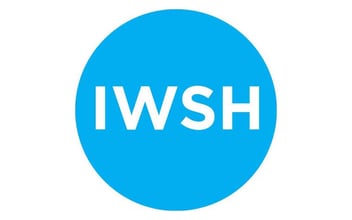People living on the Navajo Nation in New Mexico don’t take clean water and safe sanitation for granted. More than 30% of the residents live without a faucet or toilet, and plumbing and piping infrastructure is limited.
Non-governmental organizations (NGOs), like DigDeep, engage with IWSH to convene and mobilize trained plumbers who can design and install systems that ensure lasting change. And in turn, share demonstration projects like this with local tribal leaders to broaden consideration of solutions that can improve critical sanitation needs for Navajo people.
The IWSH Community Plumbing Challenge brings skilled volunteers together with community members to assess the situation, identify needs, and provide the appropriate plumbing solutions. Our latest Challenge brought our team to the Baca-Prewitt Chapter on the eastern side of the Navajo reservation in New Mexico.

Every Building has a Purpose
The challenge was to fix failing wastewater systems for two community buildings, the Baca Chapter House and the Baca Senior Center. These buildings are vital to residents' quality of life, providing food service, community shower facilities, and a central space for community events and cultural activities. Effective wastewater treatment minimizes disease-causing bacteria and other chemicals that contaminate the water supply and make it unusable.

During the IWSH Community Plumbing Challenge, volunteers designed and installed individual, pressurized mound septic systems – a solution to showcase a better suited system for this area, where conventional systems are failing. “As a result of this critical work, we improved the ability to prepare meals for Baca-Prewitt senior citizens because now they have septic systems that will actually be able to handle the wastewater,” said Randy Lorge, a master plumber and IWSH Program Director, North America.
From the Ground Up: Why Navajo Nation Systems Were Failing
Gravity flow septic systems – the most common decentralized plumbing system –experience high failure rates in this region.
“The soils here do not absorb the effluent (wastewater) effectively, meaning it backs up into the buildings creating a health hazard,” Lorge explained. IWSH master plumber volunteer Sam Woolsey, a certified soil tester and septic installer from Wisconsin, evaluated the soils at the Baca Chapter House and Baca Senior Center.

This soil data gave Woolsey and Lorge the insights they needed to design individual, pressurized mound septic systems, which is a proven system technology that can be utilized for decentralized wastewater management in this area where conventional systems have failed. It also lays the groundwork and demonstrates solutions to consider future projects that face similar, challenging environments.
The IWSH Difference: Plumbing Expertise
The nationwide shortage of skilled labor has an even more severe impact on underserved areas, such as the Navajo Nation. IWSH leverages the industry-leading plumbing expertise of IAPMO and its members to design and implement solutions for complex water and sanitation challenges.
Qualified plumbers have the skills and knowledge to safely and effectively perform plumbing services. IWSH plumbers on this project knew which systems to select for best performance in the Navajo Nation and how to reduce ongoing maintenance challenges. One key facet of the system design was to oversize the grease tanks at the community centers knowing the community could not afford or coordinate regular septic pumping.
Learn how IWSH Helped Launch a New Plumbing Curriculum on the Navajo Nation.
They also installed an alarm system in the new filter septic tank to prevent small problems from becoming big ones. In the event the filter becomes clogged with debris or grease, the alarm will sound before total system backup or failure.
These design changes helped to reduce the potential of system failure and the burden on the community building’s wastewater systems. IWSH tailored a solution that acknowledged the community's need and their ability to effectively maintain the systems.
Best Practices for Plumbing Systems
“You have to understand the codes and standards with advanced plumbing systems so that everything is installed properly in a way that protects public health,” Lorge noted.
IWSH plumbing professionals submitted their system design to the Navajo EPA to gain their approval to install these systems, showing justification for the design and components. Drawing on the expertise of IAPMO staff and IWSH volunteers, IWSH specified the materials, design, and installation of private sewage disposal systems incorporating industry recognized practices tailored to the unique needs of the community.

It Takes a Village: Donor and Volunteer Support
The success of the project was due to the support from various partners. In addition to Sam Woolsey from UA Local 400 volunteering his time for soil testing and evaluation, DigDeep’s team of technicians joined IWSH to provide critical support on the installation and working closely with chapter leaders.
- Infiltrator Water Technologies played a crucial role by supplying most of the grease interceptors and drain field materials.
- Dahl Plumbing Supply contributed various plumbing and PVC materials, while Winsupply, through Jan Loving and Associates, secured materials at discounted prices.
- UA Local 412 provided essential materials and equipment, facilitating the project's smooth execution.
- UA Local 78 and ACCO Engineered Systems sponsored journey-level plumber Stephanie Mendias to join as a volunteer and support the project implementation.
Get Involved with IWSH Community Plumbing Challenges
Supporting WASH projects offers a unique opportunity for companies and individuals in the water and sanitation industry to contribute to meaningful change. By partnering with organizations like IWSH, manufacturers can leverage their expertise and resources to address critical needs in underserved communities. Such collaborations not only enhance corporate social responsibility but also pave the way for innovative solutions that can be replicated globally.

“Indigenous people globally have borne a disproportionate burden lacking clean drinking water and safe sanitation,” said Robyn Fischer, IWSH Senior Program Director, North America.
“The Navajo IWSH Community Plumbing Challenge is a testament to the profound impact that dedicated efforts and industry partnerships can have on improving sanitation and health outcomes. As we look to the future, continued support for WASH initiatives will be essential in creating sustainable, healthy environments for all.”
.png?width=300&height=57&name=IWSH_Solid_Blue-Black_RGB%20(1).png)




